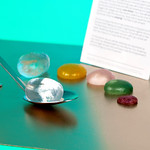How would our world look like 20, 30, 40 or 50 years from now? Will we monitor each individual on the planet to live a low-risk life? Will we replace organs, eyes, or other parts of our body with artificial alternatives? Will we upload our brains and live on a server? Or do we seek ways to embrace a life more related to mother earth? In this Design Fiction project, several potential healthcare futures are explored. The project is a collaboration between Philips Design, Eindhoven University of Technology, Design Academy Eindhoven, and Frank Kolkman.
When designing and developing for an audience, as was done in this project, a wide range of different opinions have to be dealt with. A well-known example are robots and Artificial intelligence (AI). Some people only see the positive side and potentials: what if robots could take over all our work so we have full-time vacation? Others only see the downsides and risks: what if robots become smarter than people and start attacking us? Either way, the truth will be somewhere in the middle, but it is very important to capture such opinions and discover what society thinks of current developments. The goal of this project was to do exactly that by developing design probes for four potential healthcare futures – based on a framework by Philips Design – and exhibiting them during the Dutch Design Week (DDW) and within Philips to provoke a debate.
During the first part of the project, four teams each developed a design probe for one of the potential futures, which were exhibited at the Dutch Design Week.
The project was continued within another team and a fifth probe was designed based on the insights gathered at the DDW. This time, the focus was laid on preventive healthcare in the present time, which led to the design of a fictive device that helps parents to monitor their baby’s health and aids them in growing a healthy child.
EN
⌈FR⌋
Probing Future
/ Abstract /
In this Design Fiction project, several potential healthcare futures are explored in a collaboration between Philips Design, Eindhoven University of Technology, Design Academy Eindhoven, and Frank Kolkman.




